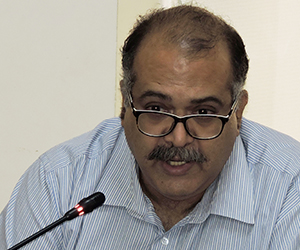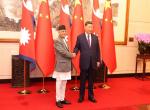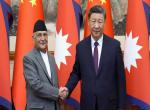The Leader of Opposition in the Rajya Sabha, Arun Jaitley, best articulated the sentiment sweeping through large parts of India in the recent months. Reacting to the resolution of the Pakistan National Assembly on Kashmir and Afzal Guru’s hanging, Jaitley said that “if India can be kicked around in this manner, there is something seriously wrong about our external policy”. If it were only Pakistan, once again resorting to its incorrigible irredentism on Kashmir, it could have been explained away. But what has added to the sense of disquiet about the drift in India’s neighbourhood policy is the glaring inability of the incumbent government to play an effective role in India’s own backyard. From Maldives to Myanmar, from Afghanistan to Bangladesh, from Sri Lanka to Pakistan and Nepal, India almost appears to be a mute bystander, watching events unfold from the sidelines, events that have a serious bearing on India’s own security.
Despite India looming large in the region, not just because of its physical size and population but also its economic power and military strength, it has not been able to translate this into effective power on the ground. What is worse, India seems to have taken the fairy tale of non-interference and non-intervention, especially of the unsolicited or uninvited kind, in the affairs of other countries so seriously that it has even refused to exercise its natural influence in many of the countries of the region. While the lament that India doesn’t have or hasn’t developed sufficient leverages and pressure points that will allow it to use its influence in the neighbouring countries is often voiced, the tragedy is that India seems chary of using even the leverages that exist.
Like the perception in Pakistan of the US being behind every leaf that moves in that country, there is also a perception among some of India’s neighbours that nothing moves in their countries without India’s concurrence. A successful diplomacy would be one that exploits this perception and uses it as an asset in order to influence the course of events without being seen to be either interfering or intervening in the domestic affairs of any country. Instead, India goes overboard in trying to dispel this perception by adopting a hands-off approach. Worse, India expects all other countries to do the same.
Politics, whether domestic or international, however, abhors vacuum. Thus it is that India’s failure to use its considerable influence in Nepal to sort out the political mess there has resulted in China moving into Nepal in a big way. Consequently, India’s influence is withering away at an alarming rate. There was a time not long back when countries like the US and UK expected India to take the lead in Nepal. But after India’s failure to act in a meaningful way despite the bulk of Nepalese political players looking towards India, created a situation where Nepal is fast spiralling out of India’s sphere of influence. For India to now crib and complain about the inroads made by the Chinese is puerile.
In Nepal, a lot of the blame must rest on the cluelessness in the Indian foreign office about the enormous changes in the Nepalese polity. India’s Special Envoy, who had served as Ambassador in Nepal, failed to understand that the Twin Pillar policy – King plus multi-party democracy – had run its course. By continuing to support this anachronism, India only shot itself in the foot. The situation could have been retrieved subsequently, but only if India had a clear and coherent idea on what exactly served its interests in Nepal and how it planned to achieve its policy objective. But in the absence of this clarity, the easiest thing to do was mouth slogans and do nothing, except react and respond to situations as they developed.
Forget about Nepal, even in Sri Lanka, India seems hell bent on making a hash of things. Effectively, India seems to have reduced its Sri Lanka policy to a single point agenda – the state of Tamils in Sri Lanka. This is of course partly because of political compulsions of the government in New Delhi and the pressure being put on it by crucial allies in Tamil Nadu. But when emotionalism starts holding all other critical national interests hostage, then failure of foreign policy is a natural outcome. While even the Lankans understand India’s interest in the Tamil issue and are willing to engage with India in finding a solution, surely passing resolutions in the Indian Parliament or supporting Human Rights resolutions against Sri Lanka at the UN is hardly any way of conducting relations with a friendly country in which India has important economic and strategic interests. Moreover, India’s carping over Lanka asking the Chinese to develop ports is completely disingenuous. Since the 1950’s, whether it was on the Trincomalee oil depot, the Radio Ceylon frequency, or in recent years the Hambantota port and Colombo port expansion, the Lankan’s have always given the first offer to India. Only after India refused to participate in the project was it given elsewhere. After first rejecting the Lankan proposal and then complaining when the Lankans farm it out to someone else, India only invites ridicule.
Over the years, in the region, India has gained the dubious reputation where its friends have no faith in it and its adversaries do not fear it. According to a former chief of the Indian external intelligence agency, Research and Analysis Wing (RAW), this is because the policy framework (for whatever it is worth) is geared towards appearing as nice guys who are respected out of love and not out of fear. While repeatedly mouthing inanities like ‘friendly, historical, cultural and civilizational relations’, India seems to have actually internalised this tripe, and in the process forgotten the basic dictum of international diplomacy that nations have ‘permanent interests’ which should guide their foreign policy.
As for standing solidly behind friends, the words of a top Pakistani politician come to mind. Interacting with him as part of the back channel diplomacy, his Indian interlocutors tried to impress upon him the benefits of opening up to India. This Pakistani politician didn’t really need any convincing on this score. But his counter question to his Indian interlocutors stumped them. He asked “will India stand by me if I face trouble at home because of reaching out to India?” Sure enough, once he landed in trouble with the Pakistani ‘deep state’, India simply forgot about him, until he once again made a comeback when the same short-sighted Indian establishment started scurrying to curry his favour. But the damage had been done.
What happened with this Pakistani politician is something that has happened with innumerable well-wishers and friends of India in the neighbourhood. The result: no one really trusts India’s word anymore and only someone really crazy will go out on a limb for India. Some of this we are today witnessing with the deposed president of Maldives, Mohammed Nasheed. Beguiled by the approach and promises of the current President Waheed, the Indians let Nasheed hang out to dry and soon realised that they had been led up the garden path by the Islamist leaning Waheed and his cohorts. In a deliberate move, Waheed threw out the Indian company building the Male airport, has been openly bad-mouthing India in China, has been hobnobbing with Islamists (including the Pakistani terrorist group Jamaatud Dawa / Lashkar-e-Taiba), has allowed China to build infrastructure that could become part of the ‘string of pearls’ encircling India. And what has India done apart from twiddling its thumbs?
Instead of ‘winning friends and influencing people’, India seems to have perfected the art of ‘how to lose friends and alienate people’ in its neighbourhood. If the enormous time, treasure and thought wasted on trying to normalise what is an utterly fruitless relationship with Pakistan had been invested on the other countries of the region, perhaps India would a lot more to show for its labours. Of course, while it would be unfair to heap all the blame for this developing disaster of foreign policy only on the present government, the current political leadership – it is actually a travesty to use the word ‘leadership’ in the context of the current Prime Minister – must bear its share of responsibility for foisting a befuddled foreign minister on the country and not providing any sort of clear political direction to the bureaucracy.
But asides of the sheer absence of even a modicum of statecraft in the incumbents – quite natural for a technocrat-led government of the babu, by the babu, for the babu (and one daresay, baba) – there are other equally serious problems that have brought India to such a pass. There are structural and systemic issues, political compulsions, lack of practical policy making experience and even intellectual capacity and understanding in academia (think-tanks and universities), and a serious attention deficit syndrome (not just in the media but also in the policy making and political establishment) which have also contributed to the inability of the Indian state in playing a robust role in shaping developments in the neighbourhood.
The Ministry of External Affairs is sorely underequipped and understaffed, not to mention, overburdened (actually deluged) by routine matters that the officials just don’t have the time to do long term planning and strategising. The Perspective Planning Division which was supposed to do some of this work is essentially a dumping ground for officers. Perhaps, if there was synergy between the officials and academia (think-tanks and universities) some of this could have been outsourced. But partly because official India is more bothered about protecting its turf than protecting national interest, partly because of a certain superciliousness that characterises people who manage to pass the civil services exam and partly because of the generally poor intellectual capacity and wooly headed and theoretical approach of academia which is so often completely divorced from the hard and harsh realities of international politics and power, there is practically hardly any input in policy making from outside the government. Another huge problem is the tendency both among officials and non-officials to tow the line which they think the political master wants to hear. Sycophancy is a pervasive phenomenon in the system and hence no one is ready to make a dispassionate analysis or recommendation because it might jeopardise the post-retirement prospects of the bureaucrat. Actually, the re-employment industry that has been opened by this government for never letting pliable and fawning (if also foolish and incompetent) officers retire, is to a large extent responsible for the faulty policies on the neighbourhood.
Then there is the problem of a lack of specialisation even within the government on the region. Officials are regarded as experts on a country because they happen to have served there. But most of them don’t know the local language, don’t know the sociology of the place, don’t have any idea of political complexities, and have only a perfunctory knowledge of the economy. In any case, for most officials a posting in the neighbourhood is often a fate worse than death. Like in the IAS, where a young officer thinks his life has come to an end if he is allotted a North-East cadre, many IFS officers would rather serve as irrelevant third world diplomat in Europe or America than as a relevant diplomat in the neighbourhood. But why blame only the bureaucracy. Statecraft has been reduced to the misuse and abuse of CBI to arm twist political allies and rivals. The Central Government is unable to factor in the growing influence of border states in formulation of foreign policy. While there is no constitutional requirement to consult states or even parliament on issues of foreign policy, there is a political argument in favour of doing this. This means evolving a mechanism to engage with states not only through a regular liaison with state governments but also a public outreach for explaining foreign policy imperatives. Otherwise, be ready for fiascos like the Teesta water agreement and the current uproar over the Tamil question in Sri Lanka.
The media too must share part of the blame. Quite simply, for the media the neighbourhood isn’t sexy enough to cover on a regular basis. How much column space or air time has been devoted to the incredible Shahbagh movement in Bangladesh? And would the Tamil issue in Sri Lanka have got so much coverage if it wasn’t for its repercussions on domestic politics? The media indulges in parachute journalism in the neighbourhood and there is practically no specialisation on any of the neighbouring countries. Apart from one or two newspapers, how many media outfits have bureaus in the neighbouring countries? Having a stringer isn’t quite the same thing as posting one or more correspondents in countries which have such critical bearing on India’s national security. The think-tanks are no better. Most of them are nothing more than glorified event managers, spending large sums of money in hosting generally pointless track-II meetings and seminars. But ask them to send a researcher for a couple of months to a neighbouring country, and they will balk. The Americans on the other hand encourage and finance young researchers to spend even a couple of years in the country of their interest.
If India has to pull its weight in the international community, it must first be able to use its influence in its own backyard and shape the region in way that it advances India’s interests. But for this to happen, India must first know what it wants. Then, it must forge the instruments for achieving its objectives. This will require investment – of time, money and intellect. Without this, India will not just see a whittling down of its influence, but worse, face serious destabilisation in its periphery which cannot but have a severe impact on India’s own security and stability. If however the periphery remains peripheral for the policy and opinion makers in this country, then it will only be at the cost of India’s own well-being.
Published Date: 24th March 2013










Post new comment